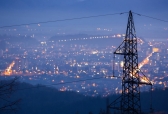GOP Accuses Dems of Undermining Electrical Grid in Overzealous Push to Combat Climate Change
GOP lawmakers accused Democrats on Tuesday of undermining America’s electricity grid in their push to combat climate change.
During a House Energy and Commerce Committee hearing, Republicans criticized the Climate Leadership and Environmental Action for our Nation’s (CLEAN) Future Act and its requirement for 100 percent carbon-free electricity by 2035.
“I am concerned [this legislation] is going to take us backward to a time before reliable electricity and modern conveniences,” said Rep. Cathy McMorris Rodgers, a Washington Republican and the ranking member of the Energy and Commerce committee.
McMorris Rodgers and others on the panel say that the bill is too ambitious.
Running nearly 1,000 pages, the legislation seeks to radically transform the U.S. economy and bring it in line with the goals of the Paris Climate Accord — which President Biden rejoined earlier this year.
Among other provisions, the bill seeks to end the country’s reliance on fossil fuels for electricity generation. To accelerate the transition, all retail electricity suppliers must reach at least 80 percent clean energy by 2030 and all-electric utilities must offer some form of solar power to customers.
The move is explicitly meant to target the coal and natural gas industries, which produce nearly two-thirds of all electricity consumed across the U.S., according to the Energy Information Administration.
Democrats argue an overhaul is needed since electricity production accounts for a quarter of the country’s annual greenhouse gas emissions.
“One of the most important steps to combat the climate crisis is to make our power grid cleaner and more reliable,” said House Energy Commerce Chairman Frank Pallone, New Jersey Democrat.
Republicans, though, say efforts to phase out stable means of electricity production, like coal and natural gas, are courting disaster.
“Keeping the lights on is needed for a prosperous society and vital to our health and safety. It’s key to our quality of life and lifting people out of poverty. Policymakers should not lose sight of that,” said McMorris Rodgers.
The reality of America’s dependence on fossil fuels is heavily understated. Recent surveys indicate that nearly 80 percent of all U.S. electricity comes from either fossil fuels or nuclear power. Meanwhile, less than 19 percent comes from renewable energy sources.
Complicating matters is that many forms of renewable energy, particularly solar and wind power, cannot sufficiently produce the amount of electricity most Americans use daily.
As lawmakers pointed out, that drawback has become more evident as much of the Pacific Northwest battles an unprecedented heatwave. With temperatures across the region climbing as high as 110 degrees fahrenheit, communities have seen electricity companies impose mandatory power outages.
The problem results from zealous state and local green-energy mandates that have hobbled the ability of utility companies to meet demand.
Washington, in particular, has been hit hard because of a law its state legislature passed in 2019 requiring all utilities to phase out coal by 2025 and reach net-zero emissions by 2030.
The move was lauded by environmentalists, who proudly noted earlier this year that 70 percent of the state’s electricity comes from non-fossil fuel sources. Now with a heat wave endangering residents and electricity companies struggling to provide power, the rush to jettison fossil fuels looks like a big mistake.
“We’re no strangers to extreme weather in the Pacific Northwest. These weather events have solidified the importance of reliable power,” said McMorris Rodgers.
Not only are green energy alternatives less reliable and productive than fossil fuels or nuclear power, but such sources also can’t be widely deployed across the country. For instance, solar and wind power are less effective in areas that face moderate to extreme winter temperatures.
“There aren’t enough solar panels or wind turbines to generate the electricity required to power the U.S. economy,” said Steve Milloy, who was a member of former President Donald Trump’s presidential transition team for the EPA, during a recent interview.
“Solar and wind are temperamental and can’t be adapted to work in every part of the country,” added Milloy.
Earlier this year, the temperamental nature of alternative energy sources played a disastrous role in the record cold snap that hit Texas. Across Texas, wind turbines account for nearly 20 percent of all electricity produced.
That reliance, along with the state’s oil and natural gas plants not being weatherized for extreme cold, led to a massive, nearly week-long power outage. The impact was severe enough that more than 100 people died, according to official accounts.
If the CLEAN Future Act or just its 100 percent carbon-free electricity standard becomes law, Republicans say such outages would become more frequent.
“The committee should be focused on strengthening the reliability of the electric grid to prevent blackouts,” said GOP Rep. Fred Upton of Michigan, a former chairman of the House Energy and Commerce panel.
“Instead, the majority is pushing a 1,000-page bill with more than half a trillion dollars in spending … [that] would impose harsh new federal mandates for electricity generation,” added Upton.
Source: The Washington Times
Be in-the-know when you’re on-the-go!
FREE eNews delivery service to your email twice-weekly. With a focus on lead-driven news, our news service will help you develop new business contacts on an on-going basis.
CLICK HERE to register your email address.





















